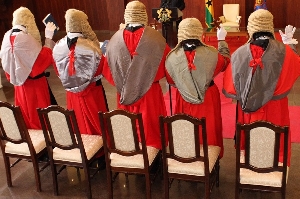Through the EITI, over 50 resource-rich countries have committed to disclosing information about their extractive sectors, including the licensing and contracts phase of the value chain which is a known hotspot for corruption.
This discussion paper draws on the Transparency International Accountable Mining Programme’s assessment of corruption risks in the mining licensing process of five EITI member countries – Argentina, Ghana, the Kyrgyz Republic, Madagascar, and Mexico.
The paper highlights key lessons for combatting corruption through effective implementation of the licence allocation disclosure requirements in the EITI Standard (Requirement 2). Improving transparency is a necessary and important strategy for fighting corruption.
However, as the country examples in this paper demonstrate, transparency alone is not sufficient to reduce corruption. To effectively tackle corruption, countries need to go beyond disclosing how the process works on paper to deal with the factors that make the licensing stage in mining vulnerable to corruption in practice.
The oil, gas and mining sectors are some of the world’s most corruption-prone industries.1 The renewed focus on combatting corruption within the Extractive Industries Transparency Initiative (EITI) provides an opportunity to make significant changes to benefit the lives of people in resource-rich countries.
Accountable Mining Programme Transparency International’s Accountable Mining Programme complements existing efforts to improve transparency and accountability in extractive industries by focusing specifically on the start of the mining decision chain: the point at which governments grant and award mining permits and licences, negotiate contracts and make agreements. The Programme’s research aims to identify the vulnerabilities to corruption in the way the licensing process is designed and implemented.
Requirement 2.1: Disclosure of the legal framework
Requirement 2.1 obligates implementing countries to disclose a description of the framework governing the extractive industries. The key lessons from the country case studies are:
Political instability and unrest can distort the functioning of the legal framework that governs the licensing process by establishing temporary or alternative arrangements which potentially allow questionable mining deals to be made behind closed doors.
Political donations, particularly during elections, can influence the design of the legal framework and decision-making process in favour of the donor.
Recommendations: Actively disclose any changes to mining laws and arrangements that are intended to replace the process set out in the legal framework; require disclosure of donations from extractive companies to enable public scrutiny of improper influence on laws and decisions.
Requirement 2.2: Disclosure of the licence allocation process
Under Requirement 2.2, implementing countries must disclose a description of the process for transferring or awarding licences, as well as the criteria used to make the decision, information about the licence recipients and any material deviations from the framework. The key lessons from the country case studies are:
Ineffective coordination among different government departments and agencies can mean that the process as described is significantly more complex in implementation. This creates potential for bottlenecks in the process and non-compliance with evaluation criteria which can be exploited through corruption to expedite licence applications.
Low institutional capacity is a red flag that may result in material deviations from the technical and financial criteria in the process set out in the legal and regulatory framework. Lessons learned and recommendations for resource-rich countries.
Transparency International’s Accountable Mining Programme research in over twenty countries found that transparency and disclosure measures are critical to combatting corruption risks. However, transparency alone is not sufficient to combat corruption.
As the paper demonstrates, additional measures need to be taken for transparency to make an effective contribution to anti-corruption efforts. The paper shares key lessons and recommendations from the Programme’s case study countries, and are applicable to all resource-rich countries, including those that are members of the EITI
.• Political interference in defining the terms of reference, the qualification criteria or in the selection of suitable applicants can give favoured companies an improper advantage and undermine the integrity of the licence allocation process.
Recommendations: Improve coordination and communication between government departments responsible for the licensing process; increase expertise and funding of licensing agencies; and strengthen checks and balances on decision-making.
Requirement 2.3: Maintenance of a publicly available licence register Requirement 2.3 specifies that implementing countries must maintain a publicly available register with detailed information about the licences granted. The key lesson from the country case studies is:
Gaps in the licence register mean that key details about who has been granted a licence, where and for how long are hidden from public view, allowing corrupt dealings and favouritism to go undetected. Recommendation: Keep the licence register easy to access, complete and up to date to allow members of the public to view critical details about licences granted.
Requirement 2.4: Disclosure of contracts and licence agreements
Contract and licences entered into or amended from 1 January 2021 must be disclosed to comply with Requirement 2.4. The key lesson from the country case studies is
:• Lack of access to licence agreements limits the ability of citizens to scrutinise the adequacy of the terms and conditions, and to detect and hold companies to account for any actions that do not comply with fiscal, social and environmental obligations.
Recommendation: Ensure the full text of licence agreements, including their terms and conditions is publicly accessible.
USING THE EITI STANDARD TO COMBAT CORRUPTION
EITI MSGs should priorities systematic disclosure to ensure that relevant, up-to-date information needed to help prevent and detect corruption is transparent and readily available on an ongoing basis, not just reported on a one-off basis each year.
EITI MSGs should require disclosure of political donations by extractive companies and recipients within the framework of the EITI.
EITI MSGs should consider capacity building activities on the legal framework among implementing officials and accountability actors as a critical step towards combatting corruption in the licensing process.
EITI MSGs should establish and resource a technical working group that may involve relevant actors from different government departments to improve government coordination (including land, environment, water resources, forestry etc.)
EITI MSGs should map out the key elements of the anti-corruption legal framework in their country such as corruption offences, authorities responsible for investigating and prosecuting corruption, the penalties and how these apply to the licensing process.
Recommendations for EITI Multi-Stakeholder Groups
EITI Multi-Stakeholder Groups (MSGs) responsible for implementing the EITI in their country can use the EITI framework to reduce corruption in the extractive sector.
Based on the research undertaken, the Transparency International Accountable Mining Programme recommends that: To effectively tackle corruption, EITI member countries need to go beyond disclosing how the process works on paper to deal with the factors that make the licensing stage in mining vulnerable to corruption in practice.
This is the Executive Summary of a discussion paper by the same name authored by Michael Odei Erdiaw-Kwasie and Lisa Caripis.
The discussion paper was written as part of Transparency International’s Accountable Mining Programme, which is funded by the BHP Foundation and the Australian Government through the Department of Foreign Affairs and Trade.
The research, language, views, conclusions and strategies outlined in this document have been created by Transparency International and Transparency International Australia and are not necessarily endorsed by the BHP Foundation or the Australian Government.
Opinions of Tuesday, 27 October 2020
Columnist: goldstreetbusiness.com















